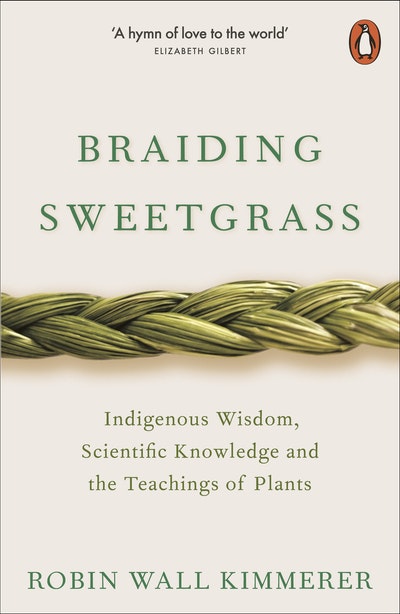- Published: 23 April 2020
- ISBN: 9780141991955
- Imprint: Penguin Press
- Format: Paperback
- Pages: 400
- RRP: $26.99
Braiding Sweetgrass
Indigenous Wisdom, Scientific Knowledge and the Teachings of Plants
- Published: 23 April 2020
- ISBN: 9780141991955
- Imprint: Penguin Press
- Format: Paperback
- Pages: 400
- RRP: $26.99
Her words were an awakening
Caroline Lucas, Guardian
It is beautiful and unusual, the rare book that might cause you to forever see the world a little differently
Sophie McBain, Observer
A journey that is every bit as mythic as it is scientific, as sacred as it is historical, as clever as it is wise
Elizabeth Gilbert
An extraordinary book, showing how the factual, objective approach of science can be enriched by the ancient knowledge of the indigenous people. It is the way she captures beauty that I love the most - the images of giant cedars and wild strawberries, a forest in the rain and a meadow of fragrant sweetgrass will stay with you long after you read the last page
Jane Goodall
With deep compassion and graceful prose, Robin Wall Kimmerer encourages readers to consider the ways that our lives and language weave through the natural world. A mesmerizing storyteller, she shares legends from her Potawatomi ancestors to illustrate the culture of gratitude in which we all should live
Publishers Weekly
The gift of Robin Wall Kimmerer's book is that she provides readers the ability to see a very common world in uncommon ways, or, rather, in ways that have been commonly held but have recently been largely discarded. She puts forth the notion that we ought to be interacting in such a way that the land should be thankful for the people
Minneapolis Star Tribune
Beautifully written . . . Anyone who enjoys reading about natural history, botany, protecting nature, or Native American culture will love this book
Library Journal
Reading this book was like looking at the world afresh. Radical, hopeful, honest and wise, Robin Wall Kimmerer has woven us a precious heartsong for difficult times
Helen Jukes
Robin Wall Kimmerer opens a sense of wonder and humility for the intelligence in all kinds of life we are used to naming and imagining as inanimate.
Krista Tippett
In a world where only six percent of mammalian biomass on the planet now comprises of wild animals, I longed for books that pressed me up against the inhuman, that connected me to an inhuman world. Braiding Sweetgrass by Robin Wall Kimmerer moved me to actual tears
Alexandra Kleeman, THE MILLIONS
I give daily thanks for Robin Wall Kimmerer for being a font of endless knowledge, both mental and spiritual.
Richard Powers, The New York Times
In Braiding Sweetgrass, botanist Robin Wall Kimmerer tackles everything from sustainable agriculture to pond scum as a reflection of her Potawatomi heritage, which carries a stewardship 'which could not be taken by history: the knowing that we belonged to the land.' . . . It's a book absorbed with the unfolding of the world to observant eyes?that sense of discovery that draws us in.
NPR
Professor and botanist Robin Wall Kimmerer knows that the answer to all forms of ecological unbalance have long been hidden in plain sight, told in the language of plants and animals, minerals and elements. She draws on her own heritage . . . pairing science with Indigenous principles and storytelling to advocate for a renewed connection between human beings and nature.
Outside
Kimmerer eloquently makes the case that by observing and celebrating our reciprocal relationship with the natural world, one can gain greater ecological consciousness.
Sierra Magazine
Braiding Sweetgrass is instructive poetry. Robin Wall Kimmerer has put the spiritual relationship that Chief Seattle called the 'web of life' into writing. Industrial societies lack the understanding of the interrelationships that bind all living things?this book fills that void. I encourage one and all to read these instructions.
Oren Lyons, Faithkeeper, Onondaga Nation and Indigenous Environmental Leader
Braiding Sweetgrass is the book we all need right now. It is a vision of a new world, of reciprocity, gratitude and seeing the living world for what it is: an abundance of gifts. Kimmerer is uniquely placed to braid indigenous knowledge with scientific learnings and she does it with kindness, ingenuity and a poet's prose. It is truly the text for our times.
Lucy Jones, author of Losing Eden
One of the most beautiful books I've ever read.
Daily Herald
Remarkable, wise and potentially paradigm-shifting
Guardian
Hands down the best book on ecology I've read
Jason Hickel (via X)



